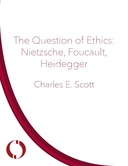Explore

Charles E. Scott's challenging book advances the broad claim that ethics as a way of judging and thinking has come into question as philosophers have confronted suffering and conflicts that arise from our traditional systems of value. The question of ethics arises from nineteenth-century European thought and finds its most effective early expression in Nietzsche's writings. The book shows how the self-overcoming movement of Nietzsche's thought recoils on his own values and, in the context of the ascetic ideal, prevents the formation of a normative ethics. After tracing a movement in Foucault's work on the formation of ethical subjectivity similar to that found in Nietzsche's thought, Scott turns to Heidegger, in whose work the question of ethics plays a prominent role but lapses in Heidegger's Rector's Address of 1933. Why did this lapse take place and what were its consequences? Scott shows that Nietzsche's ascetic ideal continued to play a role in Heidegger's thought, mitigating the constructive possibilities of the question of ethics, a question that Heidegger at times brings to bear with exceptional force.
This book is included in DOAB.
Why read this book? Have your say.
You must be logged in to comment.
Rights Information
Are you the author or publisher of this work? If so, you can claim it as yours by registering as an Unglue.it rights holder.Downloads
This work has been downloaded 19 times via unglue.it ebook links.
- 19 - epub (CC BY-NC-ND) at Unglue.it.
Keywords
- Humanities
- Philosophy
- thema EDItEUR::Q Philosophy and Religion::QD Philosophy
Editions

